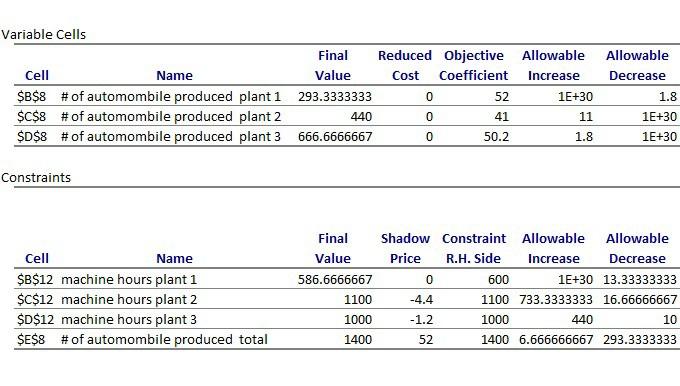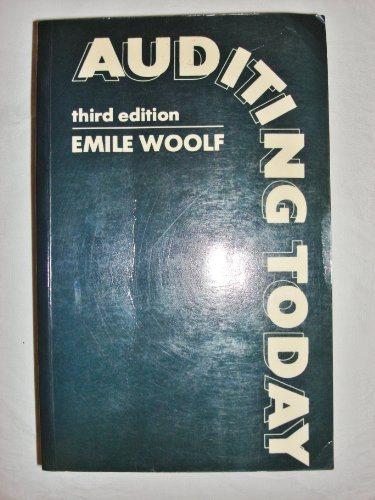Question
ONLY use the Sensitivity Report to answer tasks (5 to 8) *****the sensitivity report available below ****** *i need the answer of the questions from
ONLY use the Sensitivity Report to answer tasks (5 to 8) *****the sensitivity report available below "******
*i need the answer of the questions from 4 to 8 (one of chegg experts ask me about that *******
4. (10 Points) The UWA local in Norwood, Ohio, has proposed wage concessions at that plant to raise employment. What is the smallest decrease in the wage rate at that plant that would increase employment there? 5. (10 Points) (A) What is the cost of assembling an extra automobile given the current output level of 1400 automobiles? (B) Is it feasible to produce 1,600 automobiles? If possible, provide the new total cost, if not possible explain why not? 6. (10 Points) A team of production specialists has indicated that the auto manufacturer can achieve efficiencies at its Norwood plant by reconfiguring the assembly line. The reconfiguration has the effect of increasing the productivity of the labor at this plant from 1 hours to 0.8 hour per automobile. By how much will the firms costs fall as a result of this change, assuming that it continues to produce 1400 automobiles? 7. (10 Points) The company introduced a new technology for the machines that will increase the total capacity in both Kingsport and Bakersfield plants by 20 hours, what changes in cost you expect to happen, explain your answer based on the sensitivity analysis report? 8. (5 Points)(Bonus) What is the maximum allowance for total number of car produced per day using the same constraints of facilities?

Here is the problem itself********
Ford has three assembly plants located in various parts of the country. The first plant (built in 1937 and located in Norwood, Ohio) requires 1 hours of labor and 2 hour of machine time to assemble one automobile. The second plant (built in 1958 and located in Bakersfield, California) requires 0.5 hours of labor and 2.5 hours of machine time to assemble one automobile. The third plant (built in 1981 and located in Kingsport, Tennessee) requires 1.1 hours of labor and 1.5 hours of machine time to assemble one automobile. The firm pays $32 per hour of labor and $10 per hour of machine time at each of its plants. The first plant has a capacity of 600 hours of machine time per day; the second, 1100 hours; and the third, 1,000 hours. The manufacturers production target is 1400 automobiles per day. The production department sets each plants schedule by solving a linear programming problem designed to identify the cost-minimizing pattern of assembly across the three plants.Ford has three assembly plants located in various parts of the country. The first plant (built in 1937 and located in Norwood, Ohio) requires 1 hours of labor and 2 hour of machine time to assemble one automobile. The second plant (built in 1958 and located in Bakersfield, California) requires 0.5 hours of labor and 2.5 hours of machine time to assemble one automobile. The third plant (built in 1981 and located in Kingsport, Tennessee) requires 1.1 hours of labor and 1.5 hours of machine time to assemble one automobile. The firm pays $32 per hour of labor and $10 per hour of machine time at each of its plants. The first plant has a capacity of 600 hours of machine time per day; the second, 1100 hours; and the third, 1,000 hours. The manufacturers production target is 1400 automobiles per day. The production department sets each plants schedule by solving a linear programming problem designed to identify the cost-minimizing pattern of assembly across the three plants.
Variable Cells Final Reduced Objective Allowable Cell Name Value Cost Coefficient Increase $B$8 # of automombile produced plant 1 293.3333333 0 52 1E+30 $C$8 # of automombile produced plant 2 440 0 11 $D$8 # of automombile produced plant 3 666.6666667 0 50.2 1.8 Allowable Decrease 1.8 1E+30 41 1E+30 Constraints Cell Name $B$12 machine hours plant 1 $c$12 machine hours plant 2 $D$12 machine hours plant 3 $E$8 # of automombile produced total Final Value 586.6666667 1100 1000 1400 Shadow Constraint Allowable Allowable Price R.H. Side Increase Decrease 0 600 1E+30 13.33333333 -4.4 1100 733.3333333 16.66666667 -1.2 1000 440 10 52 1400 6.666666667 293.3333333 Variable Cells Final Reduced Objective Allowable Cell Name Value Cost Coefficient Increase $B$8 # of automombile produced plant 1 293.3333333 0 52 1E+30 $C$8 # of automombile produced plant 2 440 0 11 $D$8 # of automombile produced plant 3 666.6666667 0 50.2 1.8 Allowable Decrease 1.8 1E+30 41 1E+30 Constraints Cell Name $B$12 machine hours plant 1 $c$12 machine hours plant 2 $D$12 machine hours plant 3 $E$8 # of automombile produced total Final Value 586.6666667 1100 1000 1400 Shadow Constraint Allowable Allowable Price R.H. Side Increase Decrease 0 600 1E+30 13.33333333 -4.4 1100 733.3333333 16.66666667 -1.2 1000 440 10 52 1400 6.666666667 293.3333333Step by Step Solution
There are 3 Steps involved in it
Step: 1

Get Instant Access to Expert-Tailored Solutions
See step-by-step solutions with expert insights and AI powered tools for academic success
Step: 2

Step: 3

Ace Your Homework with AI
Get the answers you need in no time with our AI-driven, step-by-step assistance
Get Started


